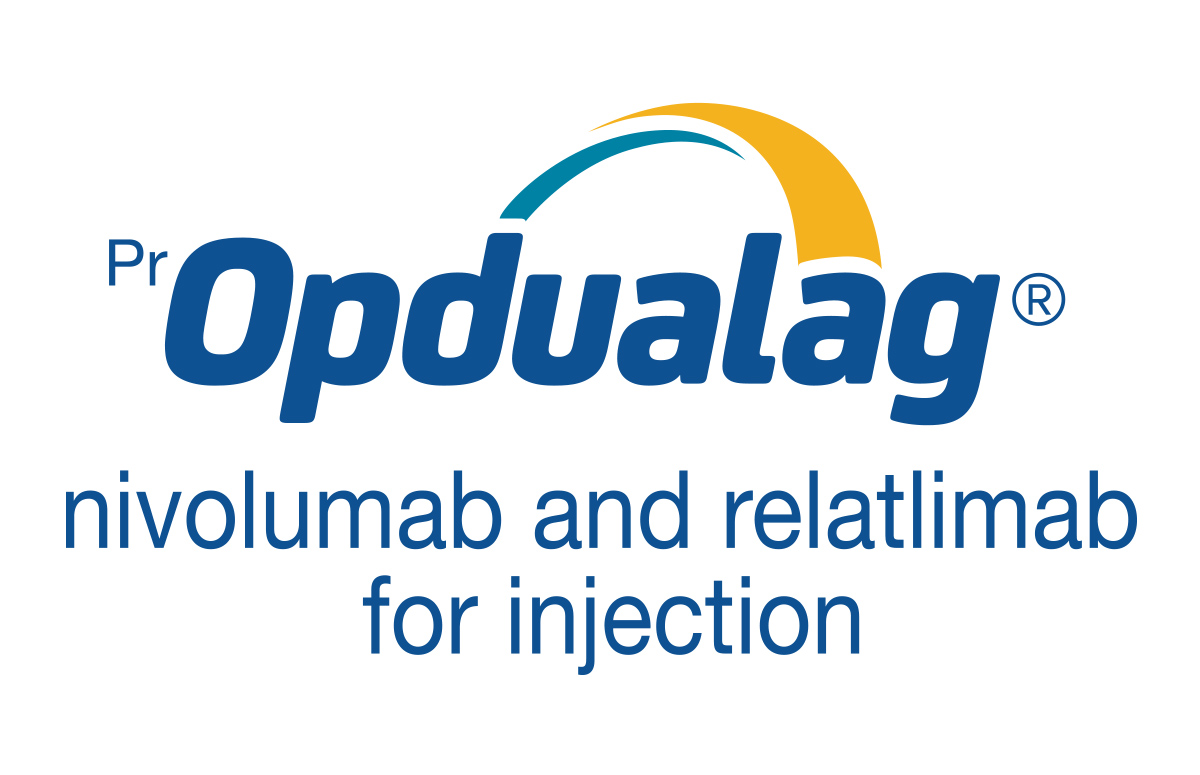OPDIVO
IMPORTANT SAFETY INFORMATION5
Clinical use:
Efficacy and safety not established in pediatric patients.
Most serious warnings and precautions:
Severe/fatal immune-mediated adverse reactions (imARs): OPDIVO as monotherapy or in combination with YERVOY (ipilimumab) can cause severe and fatal immune-mediated adverse reactions, including pneumonitis, interstitial lung disease, encephalitis, myocarditis, Stevens-Johnson syndrome (SJS), toxic epidermal necrolysis (TEN) and autoimmune hemolytic anemia. Immune-mediated adverse reactions may involve any organ system. Onset may occur during treatment or months after the last dose. Early diagnosis and appropriate management are essential to minimize potential life-threatening complications. Monitor patients for signs and symptoms of imARs and appropriately manage with treatment modifications. Permanently discontinue for any severe imARs that recur and for any life-threatening imARs.
Administration: Administer OPDIVO under the supervision of physicians experienced in the treatment of cancer.
Allogeneic hematopoietic stem cell transplantation (HSCT): Complications, including fatal events, occurred in patients who received allogeneic HSCT after OPDIVO. Preliminary results from the follow-up of patients undergoing allogeneic HSCT after previous exposure to nivolumab showed a higher than expected number of cases of acute graft-versus-host disease (GVHD) and transplant-related mortality. Complications may occur despite intervening therapy between PD-1 blockade and allogeneic HSCT. Follow patients closely for early evidence of transplant-related complications such as hyperacute GVHD, severe (Grades 3 to 4) acute GVHD, steroid-requiring febrile syndrome, hepatic venoocclusive disease (VOD), and other immune-mediated adverse reactions, and intervene promptly.
Multiple myeloma: Increased mortality in patients with multiple myeloma [not an approved indication] when OPDIVO is added to a thalidomide analogue and dexamethasone. Treatment of patients with multiple myeloma with a PD-1 blocking antibody in combination with a thalidomide analogue plus dexamethasone is not recommended outside of controlled clinical trials.
Other relevant warnings and precautions:
· imARs have occurred at higher frequencies when OPDIVO was administered in combination with YERVOY vs. OPDIVO alone.
· Severe cases of these imARs have been observed, including fatal cases. Monitor patients for signs and symptoms of:
- Cardiac adverse events and pulmonary embolism with combination therapy
- Endocrinopathies, including hypothyroidism, hyperthyroidism, hypoparathyroidism, adrenal insufficiency, hypophysitis, diabetes mellitus, and diabetic ketoacidosis
- Diarrhea, additional symptoms of colitis, and cytomegalovirus (CMV) infection/reactivation
- Hepatotoxicity, including hepatitis
- Pneumonitis or interstitial lung disease
- Nephrotoxicity, including nephritis and renal failure
- Rash, Stevens-Johnson syndrome, toxic epidermal necrolysis
- Encephalitis
- Aplastic anemia
- Myelitis (including transverse myelitis)
- Autoimmune hemolytic anemia
- Myotoxicity (myositis, myocarditis, and rhabdomyolysis)
- Other imARs, including solid organ transplant rejection and rapid-onset and severe graft-versus-host disease (GVHD)
· Infusion reaction
· Patients on controlled sodium diet
· Caution when driving or operating a vehicle or potentially dangerous machinery
· Haemophagocytic lymphohistiocytosis (HLH)
· Effective contraception in women of reproductive potential
· Pregnancy and nursing women
· Has not been studied in patients with moderate or severe hepatic or severe renal impairment
For more information:
Please consult the OPDIVO Product Monograph for important information relating to adverse reactions, drug interactions, and dosing, which have not been discussed in this piece.
The Product Monograph is also available by calling us at: 1-866-463-6267.
References:
1. OPDUALAG Product Monograph. Bristol-Myers Squibb Canada.
2. NCCN clinical practice guidelines in oncology (NCCN Guidelines®). Melanoma: Cutaneous. Version 2.2025. January 2025. Available here.
3. Lipson EJ, et al. Nivolumab Plus Relatlimab in Advanced Melanoma: RELATIVITY-047 4-year update. Eur J Cancer 2025.
4. Long GV, Hodi FS, Lipson EJ, et al. Overall Survival and Response with Nivolumab and Relatlimab in Advanced Melanoma. N Engl J Med Evid 2023;2(4).
5. OPDIVO Product Monograph. Bristol-Myers Squibb Canada.
6. YERVOY Product Monograph. Bristol-Myers Squibb Canada.
